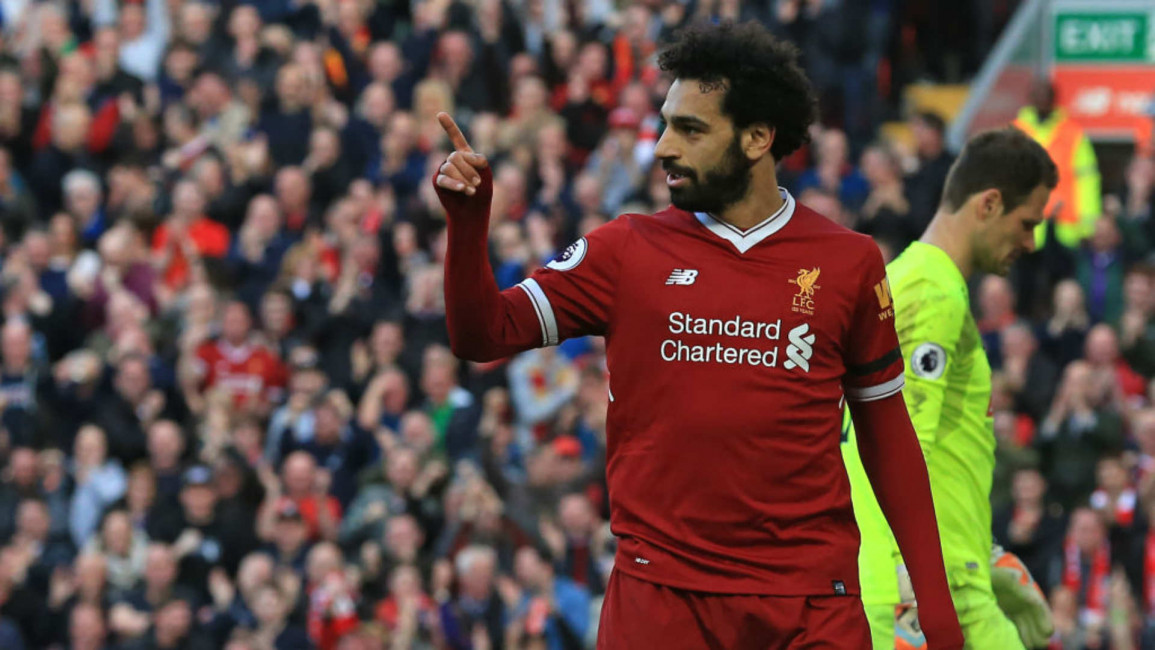
Liverpool's Mo Salah is being exploited by Sisi's bloody regime
There is no doubt that Salah enjoys considerable support in his home country. His face adorns a mural in downtown Cairo alongside the great Egyptian writer Naguib Mahfouz and the superstar singer Umm Kalthoum. He has even been eulogised as "Egypt's fourth pyramid".
Celebrated as an Egyptian rags-to-riches story, Salah is loved by the people and, more worryingly, by the government.
Read more about Mo Salah
He was manually added to the ballot paper by protesters during recent elections and is splashed across the front cover of state-run newspapers every day.
Given the hype, anyone would think Egypt is a place where the ambitious are celebrated and encouraged to fulfil their potential - when in fact thousands of youths are spending their formative years languishing in cells on death row, waiting only to hang from the gallows.
Military strongman Abdul Fattah al-Sisi has a tortured past with football.
In 2015, two years into his presidency, 33 Zamalek SC fans were trampled to death at the gates of the stadium after police kettled thousands into a 12-foot-wide corridor, fired teargas and shotgun pellets into the crowd and closed the barricades so they could not escape.
Three years earlier, Sisi was director of military intelligence during the 2012 Port Said massacre of Al-Ahly's support group, the Ultras. Seventy-two were killed when fans from the rival Al-Masry team swept upon them with knives, clubs and rocks during a match. Some were trampled to death and others thrown off the stands.
Questions were raised as to how the perpetrators, who should have been searched, brought such weapons into the stadium. Someone switched off the stadium lights as Al-Masry's fans descended, and the doors to the Ultras' escape route were locked.
Witnesses believe security forces were settling old scores. The Ultras - a huge organised group of mostly young men well accustomed to confronting police - were on the front lines of the 2011 uprising, chanting that the military were "dogs like the police".
As usual in Egypt, the military-backed regime's attempts to make sure nothing is politicised has in turn meant that everything is politicised.
Egypt's election produces surprise runner-up: Mo Salah
A Cairo court has banned the activities of hardcore football fan groups, including the Ultras, and labelled them "terrorist organisations" - hardly the actions of a system which supports the footballing achievements of its country.
"This is not football," Egyptian footballer Mohamed Aboutrika said in the aftermath of the Port Said massacre.
"This is a war and people are dying in front of us. Is life this cheap?"
 |
|
| A mural in downtown Cairo which features Mo Salah among other famous Egyptian personalities such as singer Umm Kulthum and the Nobel-winning Egyptian novelist Naguib Mahfouz [Getty] |
Aboutrika, who endorsed the Muslim Brotherhood for the presidency, later had his assets seized by authorities after being accused of funding the group - which has now also been designated a terrorist organisation.
Other footballers who have spoken out against Sisi have also paid a hefty price. In 2015, Egyptian footballer Ahmed al-Merghany, who had taken part in the 2011 revolution, had his contract terminated after he made Facebook comments critical of Sisi.
"All we ever get from you is useless words with no actions," he wrote.
It's not just footballers that have been targeted. In 2013 Egyptian martial arts champion Mohammed Youssef stepped up to receive his gold medal at the World Championship in Russia wearing a t-shirt bearing the Rabaa salute - the four fingered sign widely circulated on social media in support of the protesters who died in the Rabaa massacre ordered by Sisi.
Youssef was sent home from Russia and dropped from the national team. He was interrogated once he arrived back in Egypt and - on the basis that he had disgraced his country - was banned from taking part in further competitions.
Salah is undoubtedly one of the best players in the Premier League, but he is no Black Power-saluting Tommie Smith or John Carlos and he is certainly no Muhammed Ali, the boxing champion who refused to be drafted into the US army to fight in Vietnam.
Read more: Egyptian star Mo Salah hits another record at Liverpool
The fervour around Salah has to be considered in the context of a $282,000 donation he made to Tahya Masr, a state-run fund controlled by Sisi and ostensibly aimed at supporting Egypt's development - as well as the fact that he has not spoken out about the atrocities taking place in Egypt.
It's true that the athletes that risk everything to speak out against injustice often pay dearly for doing so.
 |
|
| Catch up with all our football coverage here |
Colin Kaepernick is the American quarterback who knelt for the national anthem last year in a silent, peaceful protest against police brutality towards people of colour.
US President Donald Trump issued a fairly predictable response to his protest - "maybe he should find a country that works better for him" - but the implications were huge. Kaepernick has since been cast out of the league.
Still, there are many who consider Kaepernick, one of the most gifted American football players in the world, a hero for his actions.
In contrast, Salah is being used as a puppet by a regime which has trampled all over sportspeople, then woken up to realise it can use them to further its propaganda campaign abroad.
In an attempt to improve his standing, Sisi has promised new sports complexes across the country - and is bidding to host a number of international sports events.
Even the Egyptian Football Association - whose webpage is basically an image of Salah on the side of an aeroplane - is on board. In January they held a press conference in support of Sisi's presidential bid attended by the heads of football clubs and several athletes.
While it's commendable that so many people are calling in to the rehab hotline following Salah's project with the Ministry of Social Solidarity, are we supposed to believe that a government that incarcerates 60,000 political prisoners really cares about the humane treatment of drug abuse?
The campaign has shown us that Salah is clearly a highly influential sportsperson. In his position, it's one thing choosing not to speak out about human rights abuses in your country, it's quite another helping a corrupt president with his PR campaign.
Amelia Smith is a writer and journalist who has reported from across the Middle East and North Africa. In 2016 she was a finalist in the Write Stuff writing competition at the London Book Fair.
Her first book, The Arab Spring Five Years On, was published in 2016.
Opinions expressed in this article remain those of the author and do not necessarily represent those of The New Arab, its editorial board or staff.



